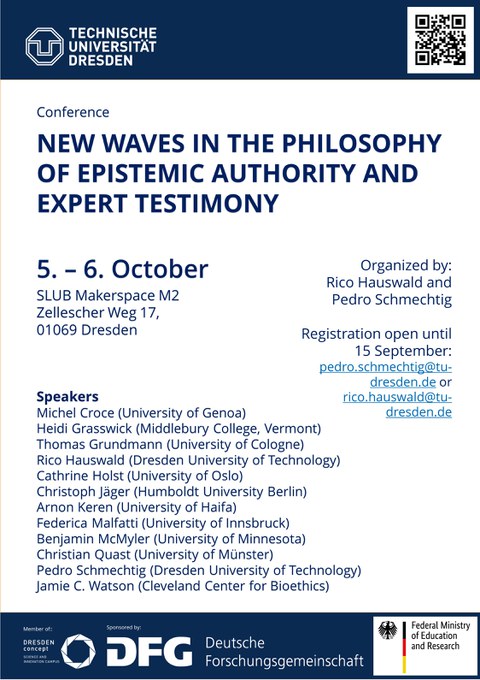Jul 21, 2023
Conference: New Waves in the Philosophy of Epistemic Authority and Expert Testimony (5.-6.10.2023)
Venue map
Click here for a detailed map of the locations of the conference.
Conference program
Click here to download the conference program.
Description
Over the past decade, epistemology has seen a surge of interest in the topics of epistemic and expert authority. In particular, the debate has focused on questions such as (i) How should the concepts of epistemic or expert authority be defined, for example, according to objective, epistemic, or functionalist approaches? (ii) How can experts and epistemic authorities be reliably identified, especially by laypeople? (iii) What is the proper epistemic stance that laypeople should take towards epistemic authorities, for example, should they preempt their own reasons or not? (iv) What epistemic goods (knowledge, understanding, etc.) can be acquired from epistemic authorities, and what are the mech-
anisms of transmission?
In addition to these fundamental questions, a number of other issues have recently come to the fore. For instance, some authors have begun to address the relationship between epistemic authority and testimonial authority, or the question of whether non-personal epistemic authorities can also exist, for example in the form of social groups, institutions, or technical artefacts such as AI systems. Furthermore, a mutually fruitful exchange of the debate on epistemic authority with other current philosophical debates is emerging. In particular, one could think of attempts to investigate non-ideal epistemic phenomena, as they have become visible in the context of the Covid 19-pandemic and other societal challenges. This concerns issues such as:
- predatory or otherwise exploitative experts and epistemic authorities;
- epistemic trespassing and other transgressions by experts, for example in the context of political advice (the so-called problem of expertocracy);
- the possibility of false, pseudo-, or fake authorities;
- distrust towards experts and epistemic authorities;
- epistemic authority and epistemic injustice;
- epistemic vice on the part of epistemic authorities on the one hand and laypeople on the other;
- reinforcing and mitigating effects of epistemic authorities on phenomena such as polarisation, echo chambers, and filter bubbles.
The aim of this workshop is threefold: to stimulate exchange on established and recent questions, to raise questions that have not yet been considered, and generally, to map out the field of future research topics.
Program (updated October 4, 2023)
Thursday, October 5, 2023
(SLUB, Zellescher Weg 17, room Makerspace M2)
| 09:30 – 10:00 | Arrival and Welcome |
| 10:00 – 11:20 |
“Preemptive authority and thinking for oneself” |
| 11:20 – 12:40 |
“Epistemic authority and the role of experts” |
| 12:40 – 14:00 | Lunch |
| 14:00 – 15:20 | “Becoming an expert: the role of process in epistemic authority” Jamie C. Watson (Cleveland Center for Bioethics) |
| 15:20 – 16:40 | “How and what do we learn from AI systems?” Federica Malfatti (University of Innsbruck) |
| 16:40 – 17:10 | Coffee Break |
| 17:10 – 18:30 | “Artificial epistemic authorities” Rico Hauswald (Dresden University of Technology) |
| 19:00 | Dinner |
Friday, October 6, 2023
(SLUB, Zellescher Weg 17, room Makerspace M2)
| 09:30 – 10:00 | Arrival and Welcome |
| 10:00 – 11:20 |
“The role of experts in policy advice: the institutional basis of trustworthiness” |
| 11:20 – 12:40 |
“False authorities” |
| 12:40 – 14:00 | Lunch |
| 14:00 – 15:20 |
“Testimony and epistemic authority in the landscape of human social learning” |
| 15:20 – 16:40 |
“On pseudo-expertise and why it’s a problem” |
| 16:40 – 17:10 | Coffee Break |
| 17:10 – 18:30 |
“Epistemic paternalism and protective authority in a non-ideal world” |
| 19:00 | Dinner |
[Unfortunately, the talks by Heidi Grasswick and Christian Quast had to be canceled.]
Registration
rico.hauswald@tu-dresden.de or pedro.schmechtig@tu-dresden.de
Travel
Here you can find useful information on how to reach Dresden by train, plane, or car: https://www.dresden-convention.com/en/dresden/destination-dresden/getting-to-dresden
The main train station of Dresden is about 20 minutes by foot, or roughly 15 minutes by public transport to the TU Dresden, where the conference will take place.
